|
Waipukurau, New Zealand 25 November 1925 - Lower Hutt, New
Zealand 29 March 2012
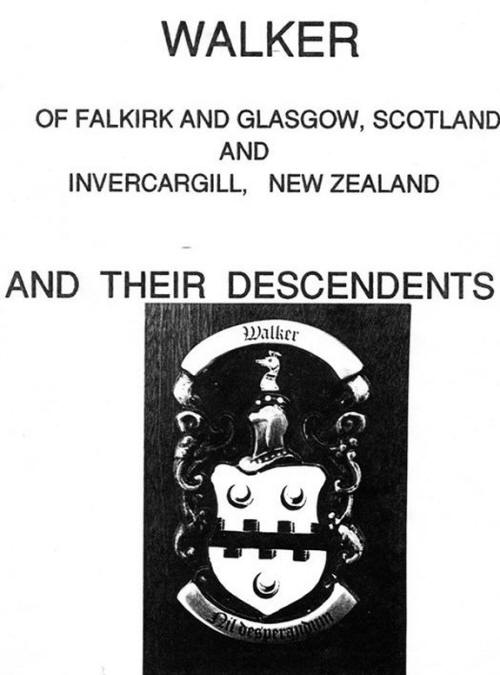

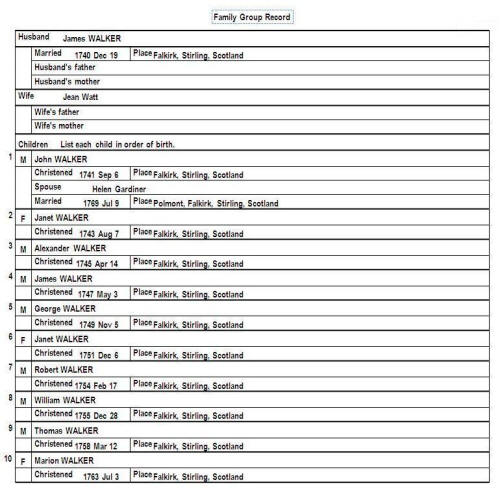
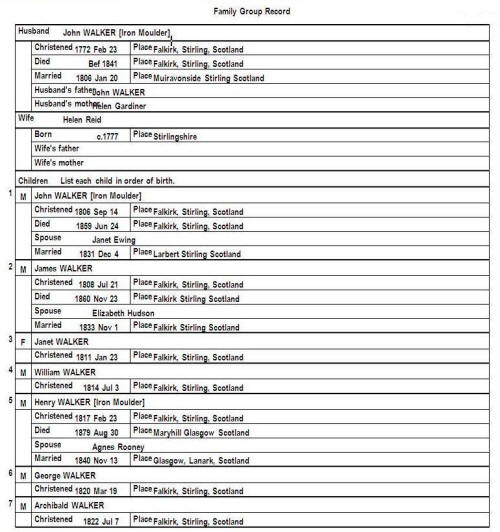
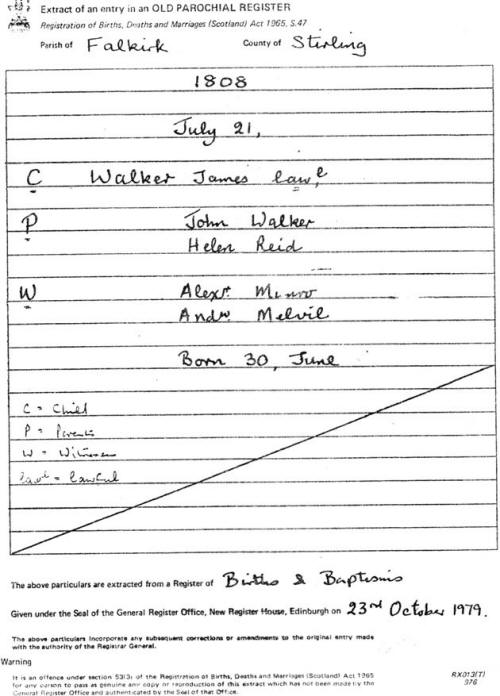
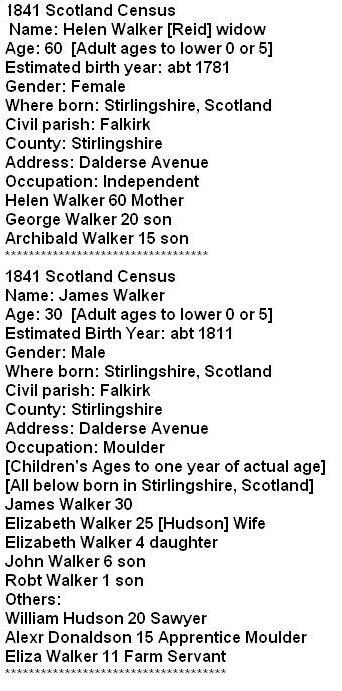
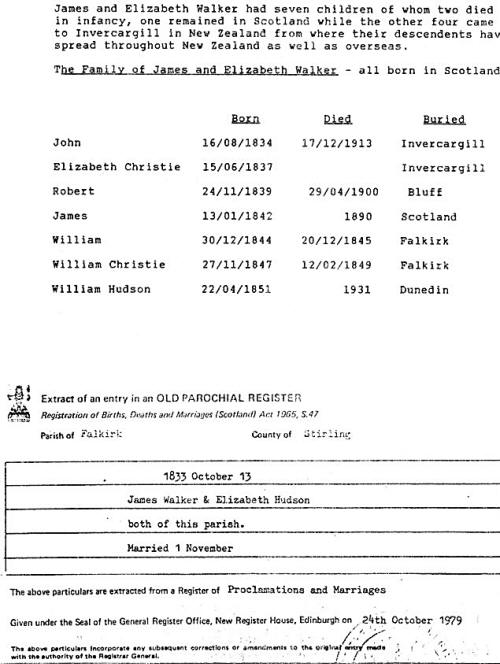
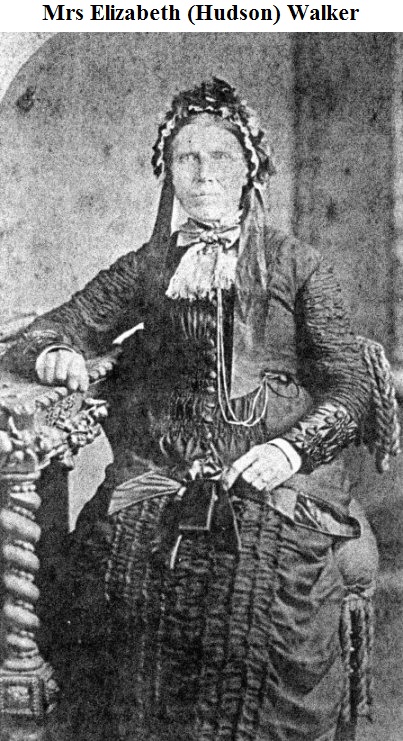
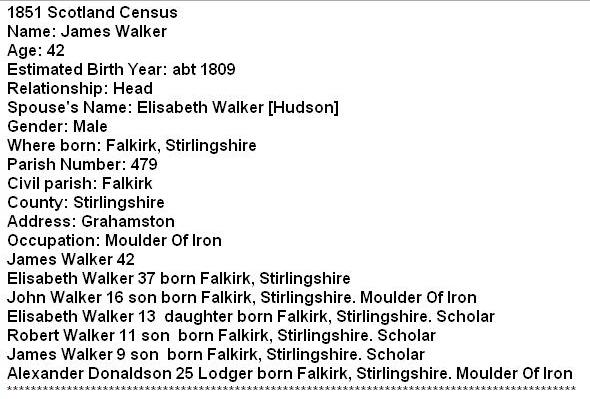
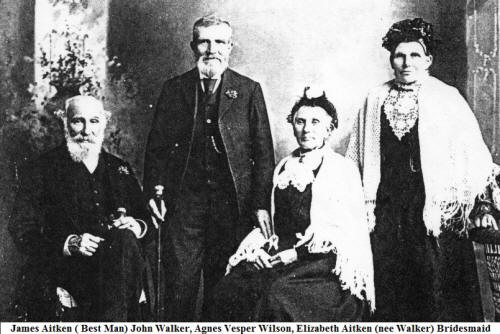
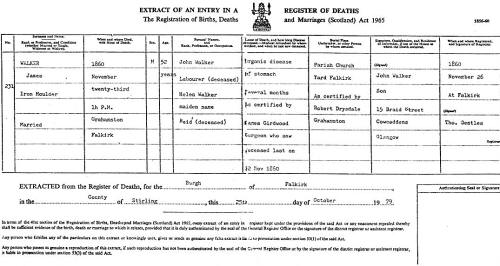

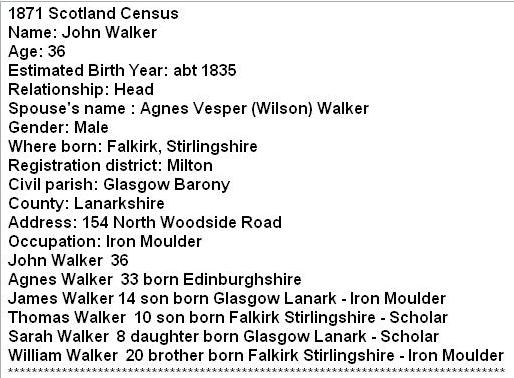
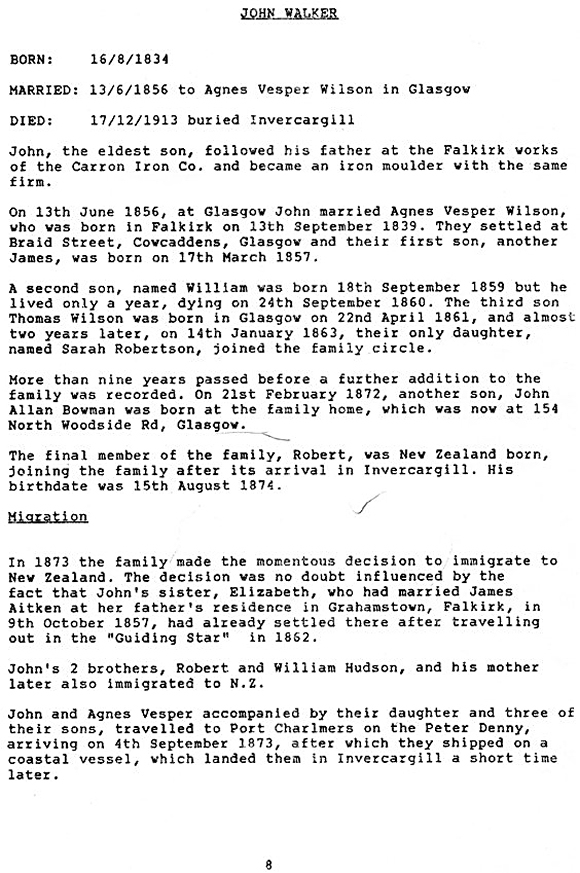
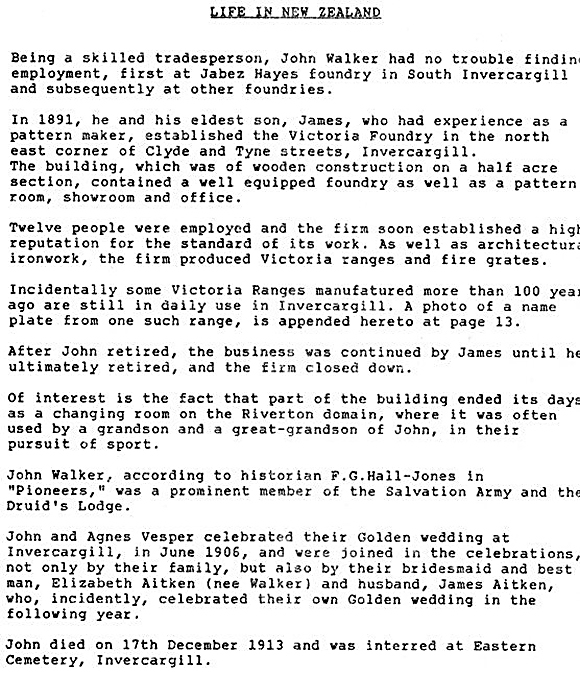
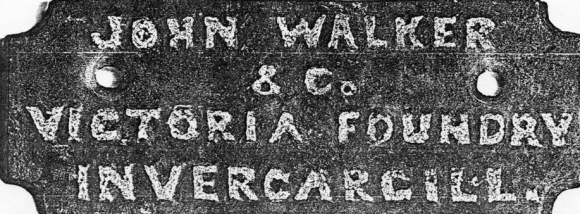
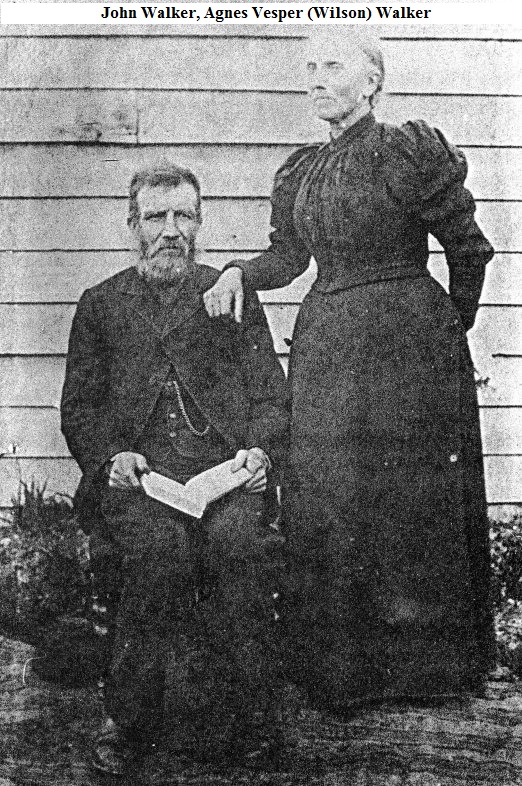
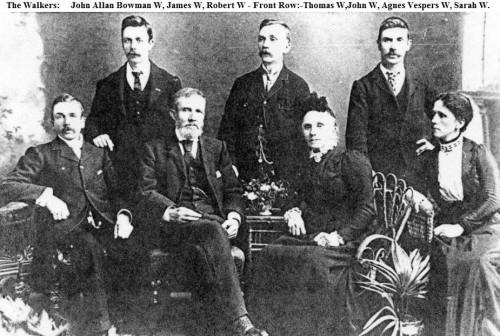
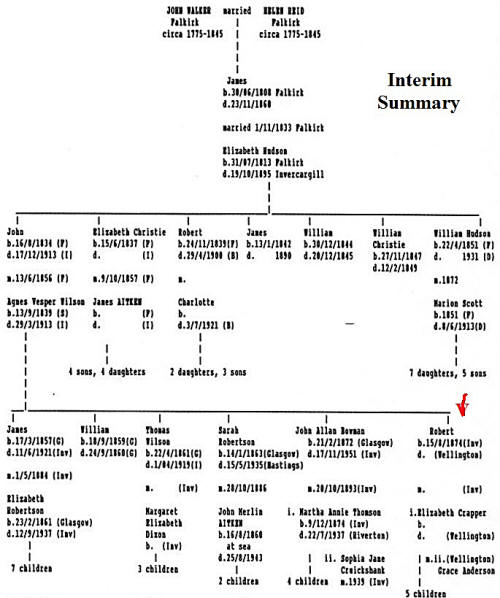
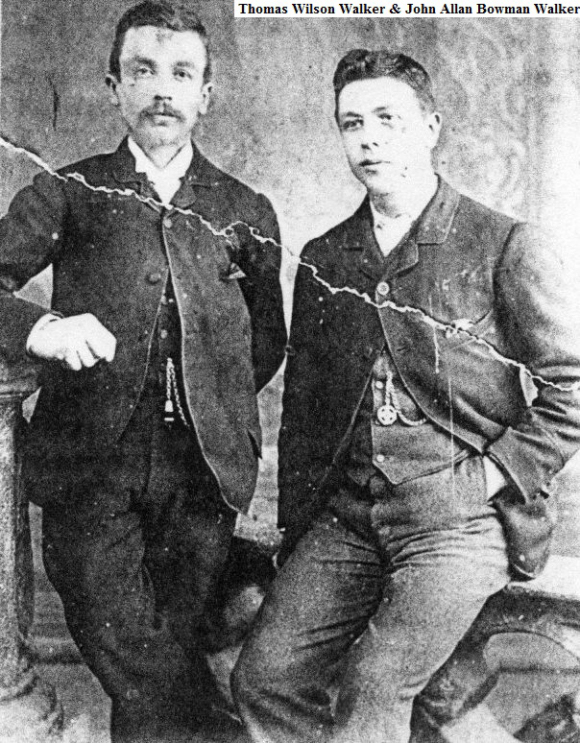
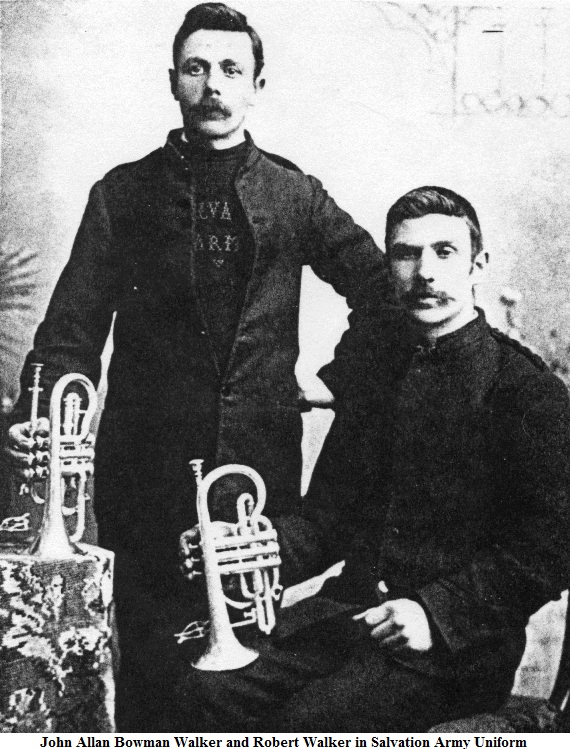
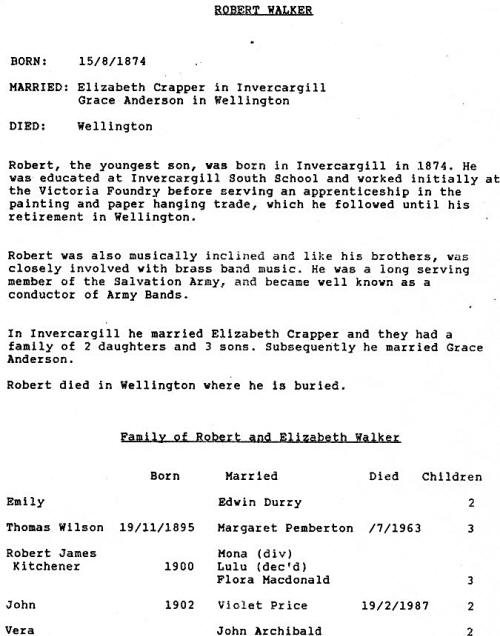
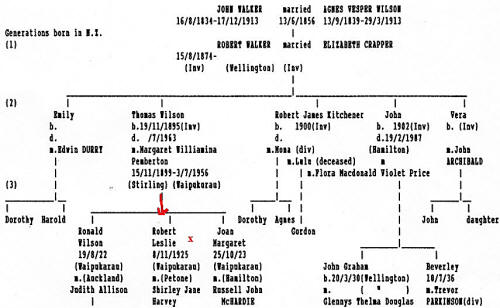
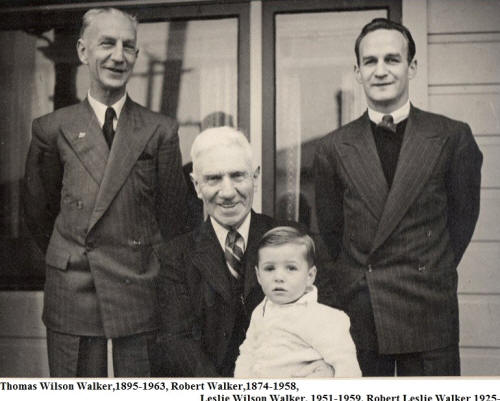
ROBERT LESLIE WALKER born
November 1925, Waipukurau.
At the prompting of my
children, I will endeavour to set down something of the history of
myself and family as I know it including reminiscences from my point of
view about my Father, Mother and Brother and Sister.
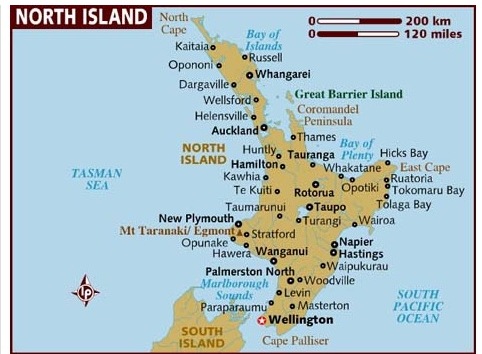
Firstly, my own personal details ….
I was born on the 8th
November 1925 in Sister Anderson`s Nursing Home in Gaisford Terrace
Waipukurau. As my mother used to say, I was a birthday present for her
26th birthday which was on the 15th November. I can even tell you that a
girl called Joan Staines was born in the bed next to me but two days
earlier. As can be expected in a small community we went right through
school together.
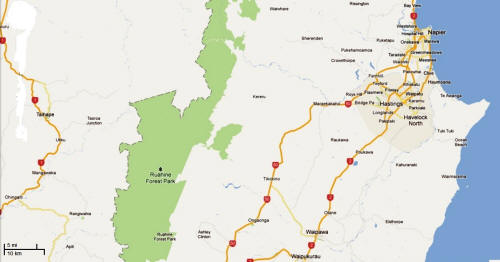
My father Thomas Wilson
Walker was born in Invercargill on 19th November 1895 and my mother
Margaret Williamina Pemberton (known to everyone as Reta) was born in
Stirling (just outside Balclutha) on the 15th November 1899. I have an
older brother Ronald Wilson Walker born 19th August 1922 and an older
sister Joan Margaret Walker (now McHardie) born 25th October 1923. Dad
was a Pharmacist and had been appointed to Pukeora Sanatorium, which was
a new TB Hospital for returned servicemen. TB was at that time a feared
killer disease which was treated by giving patients lots of good air,
good food and plenty of rest. As it was all very new Dad had to learn
more skills such as bacteriology and radiography and as he said it was a
great place to work and live.
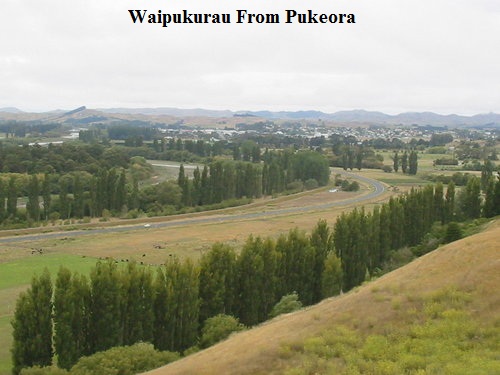
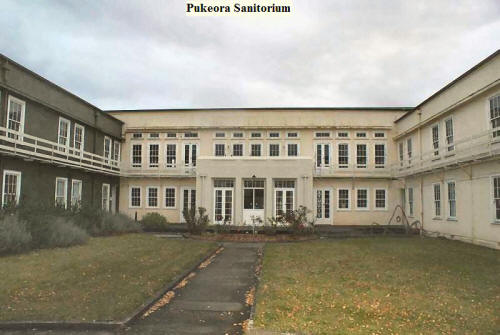
Mum of course was a
dedicated housewife and mother and a very good one at that. I can look
back now and deeply appreciate the love and care Mum gave to all of us
particularly as she was the disciplinarian. Dad never raised his voice
or hand to us. Mum was totally devoted to Dad as he was to her. She
always said how much she loved her children, had no favourites, but Dad
came first.
My first coherent
memories are of the house in Hatuma Road. This was about a mile and a
half out of Waipukurau in the country. It seemed at that time to be a
large house but in fact it was quite small. It had 4 large brick
chimneys and a long hall running from the front of the house to the
kitchen at the back. All the rooms opened off this hallway and I seem to
recall that I was in a room to the left of the hall. Out the back we had
a long corrugated iron shed that Dad used to keep wood in. It also
housed his old square tank Douglas Motor bike.
Dad used to ride this
bike to Pukeora every working day, a distance of about 2 miles, and as
the roads were only shingle in those days, had quite a few "incidents"
He did tell us about one which I think is worth relating.
Just up the road a farmer
called Fairweather had a sheepdog given to chasing motor vehicles. In
those days of course there weren’t many of these, but every time Dad
went past the dog would come out and bite at his foot as he rode past.
Dad got fed up so, in his dispensary he made up two small glass
containers of chlorine. Next morning the dog did his usual thing so Dad
reached down and broke one of the containers on the dog’s nose. As Dad
put it, the dog disappeared over the ridge in a cloud of dust and was
never known to chase cars again.
At about age 4 I recall
my Grandmother Pemberton with her new husband John Clark coming to stay.
I can remember insisting that he come with me to see all the Hawthorn
trees, which were then in full fruit. Years later I learned that all he
did when we got back was to complain about the distance I had made him
walk. Apparently it was a least a mile each way and he wasn’t used to
walking. I can also recall about that same period I had a wooden whistle
and on trying to blow it one day, I got bitten on the tongue by an
earwig which had taken up residence Still when I was about four, I can
recall Dad and his West End Orchestra practising at our place and over
the road at Davis`s place. Sandy Davis played drums, his brother (Jack)
played Saxophone, Bill Rust the Violin, and a lady whose name I can`t
recall played piano. Dad played Trombone. Dad and some of the others
used to play for the Silent Movies and the West End Orchestra was very
much in demand for Balls and Dances. Mum told me that when I was about
three, the Orchestra was playing at the Annual School Ball and she was
helping with Supper. They put me in a makeshift carry cot and put me
down at Sandy Davis` feet right by the bass drum where I happily slept
the whole night through. Perhaps that is why I love music and dancing.
At five of course it was
off to school and what a dramatic welcome I got. Summers in Hawkes Bay,
particularly to kids, were long and hot and 1930/31 was no exception. I
remember that we had gone to Napier earlier on and I have a vivid
picture in my mind of watching a large number of yachts sailing a
regatta on the inner harbour.
We then went down to
Wellington when Dad took his Annual Leave and came back home on the
second of February. On the morning of 3rd February 1931, my school
career got under way and history will tell you that this was the day of
the Napier Earthquake. As we were only 30 miles away you can imagine we
got hit hard. The quake hit at 10.30 am fortunately, as we were all out
in the playground at the time for morning break and I can remember
taking off at full speed to our teacher Miss Caughley. I was fast even
in those days and I reckon I got to her first. She was only about 5 feet
tall but I`m sure she had every Primer One child in her arms and I was
in danger of being crushed. I have no real idea how long it lasted
although it seemed a long time. A little later my sister Joan appeared
around the corner of the Standards Block and we walked off down the
School Lane to the Main Street. I seem to recall that my brother joined
us there but I`m not sure. The most vivid memory I have is seeing a
large pile of bricks in the middle of the road with the big town clock
resting on the top. These bricks were the front of the Post Office and
when you looked at it, it was like a dolls house with no front. You
could see the Counters on the ground floor and the rooms on the top
floor where the Brownes lived. He was the Postmaster. We then all walked
the one and a half miles back home to Hatuma Road to find our mother
very shaken indeed. It seems that when the earthquake hit she was by the
back door. She ran round the house to get to the front gate and on the
way a brick from a falling chimney just caught her heel and bruised it.
She told us she then had to really hang on to the front gate to stop
from falling over as the ground movement was so violent. In fact all our
chimneys had fallen down but luckily all had fallen outwards and did not
damage the roof Mum did the cooking for the next few weeks out in the
wood-shed on a Primus stove.
Dad went to Napier on the
day of the earthquake with the Medical Rescue teams and came home on the
Wednesday night. On the Thursday he borrowed a brand new Ford Coupe from
one of the San porters, a guy named "Dummy "Percival, and took me with
him back to Napier. As we approached Napier along the Marine Parade you
could see a three storey white building with a lean of 30 to 40 degrees
which I think was a private hospital. My only other strong memory of
this day was seeing a tramcar lying on its side in Clive Square with its
woodwork still smouldering. (I have since located a picture of the
hospital which was known as Dr Moore`s Hospital.) I have written at
length about the earthquake because it was such a devastating thing to
happen to anyone at such a young age and my memories are still vivid.
Memories of my years passing through school are strong and numerous but
I will in general deal with the important (to me) ones. Having survived
the earthquake we were soon back at school which had had a great number
of cracks plastered over and in all the years at primary school, I was
never sure how safe it really was. As I said we had to walk the one and
a half miles to school down the main road which was still shingle with a
rough footpath down the side. However, later on that year we shifted
into Waipukurau and lived in a house in Northumberland Street. This was
a new experience of having lots of neighbours and some of them were a
pretty rough bunch. There was another family of Walkers with a lot of
kids mostly older than us and I can remember some of the boys, Ulie,
Freddie and George. The girls names I can`t remember.
I have two strong
memories of Northumberland Street. The first was around about Guy Fawkes
Day and Dad had bought some fireworks. He had one powerful one called a
"Double Banger "which was very powerful indeed. Well we were all sitting
at the tea table and Dad was pretending to light the wick of this
"Double Banger" to scare us when unfortunately he really did light it.
He didn`t have much choice then so threw it into the open fireplace
where it exploded and brought down a shower of soot and dirt. The room
was a shambles. I seem to remember that Mum was less than pleased and
I’m sure Dad copped it when they were on their own. The second thing I
remember was being doubled on a pushbike by a boy called Dennis Bliss
who was the son of a local baker. Never having been on a bike before I
made the mistake of letting my foot hang by the front wheel, when my
sandal got caught and we had a nasty fall. The skin was taken off the
top of my feet and there was blood everywhere. Fortunately I was right
outside home and Mum in her usual capable fashion soon had me cleaned
and fixed up.
Shortly after this we
moved again; this time to Racecourse Road and a rather bigger house. I
was I think in the Primers at the time. The next year took me to
Standard One where I had a teacher we knew as Miss Pussy Williams. I
realise now that she was very young and probably just out of Training
College. I have no idea where she got the nickname of "Pussy" but I had
a real crush on her. She was lovely. My Standard Two teacher was Miss
Marshall known to all as Ma Marshall. She was a tall angular sort of
woman who was a strict disciplinarian, and whom I always seem to upset.
It wasn’t about my lack of scholastic ability as right through primary
school I was always first or second in the class, competing always with,
Bernie Dowrick, Charlie Lum Jack and Margaret Gideon. I think I topped
the class in Stds 2 and 5 and was first equal in Std 3 with Paddy
Howlett and 2nd in Stds 4 and 6.
1932 was a significant
year as we shifted to Pukeora Sanatorium, to a house on the farm below
the hospital. We were to live there until New Year’s Day 1941. Besides
the Hospital Pukeora had a 400 acre farm which produced everything
required to feed all the "live in "staff and patients. Several staff
families lived on the farm. They were McVicars (2 Boys Bob and Des)
Abrahams (2 boys Nelson and Selwyn ) Fergusons (1boy 1 girl Peggy and
John ) Howletts ( 3 boys Ray, Paddy and Monty) Walkers (2boys 1 girl
Ron, Joan and Bob) Yanko 3b ,1g David, John and one younger brother and
sister whose names I don’t remember) Mcleans (1b,1g, Alistair and Shona.
The core of these
families remained fairly constant over the next seven years but the
McVicars and Mcleans moved away. No other families moved in. Each day we
travelled to school by bus and this could be either a big Packard Taxi
or a 20 seater bus. Later on the Packard was replaced by a new Hudson
Terraplane car. Mike Udjur, a Dalmatian owned a Fish Shop, the local
Taxi and the Bus Franchise, so we never knew what we would be travelling
in. Later on during `39 and 40 I mostly rode my bike to school. I say my
bike but it was in fact owned by one of our local butchers (Charley
Wadman) and was a fully geared and equipped road racing bike.
Once again because we had
to go straight from school to catch the bus home, we never got to be
invited to people’s place or to birthday parties or such things.
Similarly as a family we never had birthday parties and did not invite
many of the kids to our place. There were enough kids living on the farm
that we formed our own fairly closed society. What a wonderful life it
was for a seven year old with literally thousands of acres to roam
around in and miles and miles of rivers and river-beds.
The Sanatorium itself was
situated at the top of the hill 4-5 miles west of Waipukurau and was
surrounded by a 400 acre farm which as I have said made the institution
virtually self sustaining. Our house was down on the farm and was about
200yards away from the Stables, slaughterhouse and pigsties which. It
sounds pretty gruesome, but they were not visible from the house and we
didn`t have a smell problem, Immediately below us down a steep hill was
the remains of 6 fowl runs. All that was left were the concrete block
bases about 30 feet by 30 feet and stepped down the valley like stairs.
These proved a wonderful playground as they were so smooth and didn't
turn to mud in the rain.
Within about two years
however they had pulled up all the fruit trees, and, a little later had
pulled the glasshouse down. I can remember 4 or 5 of us kids had been
down raiding the orchard and we looked into the glasshouse on the way
home to see what if anything we could eat. Berty Cullen the orchard
keeper and his girlfriend (later his wife) Doris Hook were having a bit
of a cuddle in the there and although he spoke a few harsh words to us
he never ever mentioned the fact that we had been raiding the orchard.
What it was to be young and innocent.
From the moment we went
to Pukeora I spent every minute I could with Tom Taylor the Ploughman,
Labourer and General Dogsbody. He was an Irishman about his middle
fifties, unable to read or write but was a wonderfully competent man on
all things farming. He loved his horses and they would do anything for
him. I spent all my years at Pukeora learning everything Tom could teach
me and by the time I was 12 I reckon I could handle any job on the farm
within my physical limits. I could plough with a three horse team and do
all the necessary things to look after the horses and harness them for
work. One of my favourite jobs was in the winter, when we would harness
Daisy our Clydesdale mare up to a dray, go and cut a load of ensilage
and then feed it out to the cows. It really ponged, but I loved the
smell, even though Mum reckoned she could smell me coming from half a
mile away.
We had one bad accident
and that was when Joan and I were riding on the footplate of our horse
drawn spreader spreading superphosphate on the paddock in front of our
house. The Super was quite lumpy and Joan and I were breaking down the
larger lumps by hand. Joan when pushing down on a lump got her finger
caught in the "star wheel" which rotated and let the super fall through
to the ground. She yelled and old Tom who was driving stopped the horses
so quickly that Joan only lost her fingernail and not her whole finger.
The farm also had a
milking herd of 120 Ayrshire cows which were milked twice a day. They
were so well trained that nobody ever had to drive them to their day and
night paddocks, or go and get them when it was time for milking. They
did it all on their own. I learned to milk by hand but it was not a
thing I enjoyed doing. I always helped with cutting and stacking the
lucerne, cutting and baling hay and ploughing and sowing. Old Tom
entrusted me with helping him set up the guide markers for ploughing. We
would take a measure from a fence at one end and make the same
measurement at the other. We would put in a tall marker stake at each
end and then I would walk the whole length of the paddock putting in
stakes every 30 or 40 yards so that they all lined up. We would start
the plough at one mark and and plough a dead straight furrow to the
other end marker. After that it was a simple matter to plough the
paddock with long straight furrows that were very much a matter of pride
in those days.
Probably the most
memorable incident of our lives a Pukeora was the night the Nurses Home
was burned down. It happened that one of our local Taxi drivers (Stan
Thompson) was courting one of the Sisters and they were parked outside
the home about midnight. They noticed flames in the Matron’s lounge.
Sister ran through the Home and woke everybody while Stan rang the
Waipukurau Volunteer Fire Brigade and any other staff member he could
find. I must say that I was not popular that night, as I wouldn`t answer
the telephone when it rang in the middle of the night. It was in the
kitchen right through the wall from my bed. Anyhow they kept ringing and
Joan finally answered and called Dad and Mum who slept right up in the
front of the house. Dad dashed off but Mum wouldn`t let us go and watch
the fire so we didn`t see it till next morning. Then there was nothing
but a pile of ashes. The only thing that survived was the asphalt tennis
court for which Ron and I were quite thankful as we used to spend hours
playing tennis there. I particularly recall that on the morning after
the fire Joan and I spent a long time in conversation with two of the
girls from the home. One of the girls was Winnie Cann and the other was
....Ford. (Can`t recall her first name).They were going into great
detail about losing everything. A short time later they arrested and
convicted Winnie Cann of lighting the fire. It turned out later that she
was a known arsonist who liked setting fire to Hotels and Nurses Home.
She apparently confessed to a number of fires but would not confess to a
Nelson Nurses Home fire in which a girl was burned to death.
Another interesting part
of life at Pukeora was our Wednesday night picture show. This was held
in the Social Hall with strict segregation of patients and staff -
patients on the left, staff on the right. It was quite laughable because
everybody breathed the same air. We had a single projector operated by
Doug Howlett and in between changing reels he played one of the five
records he had. My favourites were ‘Road to the Isles’ and ‘Peg Leg
Jack’. Coming up to the time when I was 12, I was beginning to
appreciate the difference between girls and boys and had developed a
real crush on one of my class mates called Gwen O`Connor. Gwen had
started school with us in Standard 5 as she was from Wairoa. I think her
mother had died and she had been sent to live with her maiden aunt, Miss
Beacham. However I found out that like most young girls Gwen had a
romantic streak and what she told you wasn`t necessarily the truth. So
the reality was probably a bit different. That was a great time in my
formative years as Gwen and I "went steady" until the end of our fourth
form year when she returned to Wairoa. I also had two inseparable
friends - Bob Johnston and Rod Chisholm. Bob was going steady with Kath
Hubbard and Rod was going with Pam Smith. We all went to dances,
pictures picnics etc and played a lot of tennis together …. just the
usual teenagers of our generation. After Gwen returned to Wairoa I had a
couple of brief romances with Sheila Walker and Edna Sparks, but it was
never the same as our old gang. When I look back I must say that they
were wonderfully innocent and protected days and the reality of making
your way in this world were mercifully hidden from us. I should mention
that in 1943 Bob Johnston joined the Navy as a Signalman and Rod
Chisholm who was actually two years older than Bob and I joined the
Airforce and became a Fighter Pilot. He did a tour of duty in the
Islands flying Warhawks, while Bob went to England, trained as a sonar
operator, and did his sea time on an anti submarine frigate in the
English Channel. Rod married Isobel Munro and settled in Hastings while
Bob married Nola Green and settled in Masterton. I had the good fortune
this week (23/3/99) to catch up with Bob at the Carterton Golf Club
where we caught up on a lot of history. I should mention that as at this
time Rod, Kath and Gwen have died.
When Bob and I were in
the Scouts together Rod gave us the framework of a 12 foot Indian style
canoe which his father had kept in a shed. We covered it with a double
skin of unbleached calico which we sealed with numerous coats of paint,
finishing up with a bright red topcoat. We must have spent hundreds of
hours paddling up and down theTuki Tuki River. Bob left school as soon
as he was able to (I think at age 15 ) and went to work in the Hardware
section of Hawkes Bay Farmers so Rod and I spent our spare time together
either out rabbit shooting or riding our push-bikes all over central and
southern Hawkes Bay. We both had paper rounds and on a nice Saturday
morning we would meet up after breakfast and go riding. Our journeys
(all one day trips) took us as far as Napier to the North and Woodville
to the South and all points in between. I might say that at this stage
of my life my bike was a Raleigh Sports given to me by Ron when he
joined the Airforce. I have actually never owned my own bicycle in all
my life.
One other significant
happening in the era was when I was in the Third Form at High School
(1939). Just at the start of the May holidays I had ridden my bike (on
my own) to Dannevirke and back and the day after I developed a terrible
earache. Dad took me down to the Hospital where they diagnosed an acute
infection of the middle ear (Acute Otitis Media). Now it so happened
that Dad had received his first supply of a new drug called M& B 693 or
Sulphapyridine. (This was the first of the Sulpha Drugs of which
Sulphanilimide became famous ) I was the first patient in the Hospital
to receive this drug. One of the things about sulphapyridine was that
all eggs and onion had to be excluded from the diet and they very
carefully didn`t give me any eggs or onions. However I was a very sick
boy and the only thing I could tolerate was soup so this is what they
fed me. (loaded with onions). The infection just got worse and I rather
think I was in a pretty desperate situation because without further ado
they operated on me by cutting through the eardrum and lancing the
infection directly. It took me a couple of weeks to recover before I
went home and I remember feeling very put out because I had spent all of
the May School holidays in Hospital . I felt that was a pretty raw deal.
As a comment on this I should tell you that a girl called Evelyn Halford
from my class developed the same complaint about a week after me, was
admitted to Hospital, given M&B 693 and walked out cured after 3 days. I
was rather annoyed.
[end of part one]
Part Two
I finished my schooling at High School
passing University Entrance in 1942, and taking extra subjects in Plane
Trigonometry and Drawing (Freehand and Mechanical) I passed Engineering
Preliminary and qualified for Higher Leaving Certificate in 1943. At
about this time a chap called John Pickie (our 3rd grade Football coach)
chased me up to join Hawkes Bay Farmers as a Stock and Station Agent but
I couldn`t see myself staying in Waipukurau all my life, so turned that
down. At the same time I had the opportunity to apply for an Officer
Training Course at Duntroon College in Australia. I wasn`t that keen but
the recruiting Captain kept at me by visiting me twice at school and
even asking the Headmaster to try to convince me. Dad put a bit of
pressure on me not to accept so I didn`t.
I enrolled at Victoria University and came
down to Wellington to live at a Bed and Breakfast boarding house at 120
The Terrace run by a charming lady called Mrs Baird. I must say on
looking back on that period of my life, that it was not a very happy
time. Here I was a callow youth from the country, with no friends,
schoolmates or anyone in a big city, when I was used to knowing and be
known by ev’rybody. I also had made a bad error in judgement deciding to
take Chemistry as one of my subjects as I had not taken this at High
School. I had taken Biology as a science, but this was not an option at
University because I was taking Engineering Intermediate. I would have
been better taking a Degree in the "life" sciences. This put a great
deal of strain on me so that by the end of the year I had not taken
"terms" in Chemistry although I had in Pure and Applied Maths. I must
mention that I was only able to do this year at University because my
brother Ron provided me with 3 pounds a week during the Varsity year.
At the end of the Varsity year I got a job
with my uncle, Alan Pemberton working with the Maintenance Gang at C&A
Odlins. This was an experience and a half. When I started, the gang had
a project on, which involved pulling down the Sawmill and 4 Mill Houses
at Hinakura (out behind Masterton) and rebuilding them all at Wereroa
(Levin). All went well for the first three weeks and we duly dismantled
the mill and houses into sections, loaded them up and transported them
to Levin. This involved a number of round trips. We were working around
sixteen hours a day and when we were at Hinakura the company paid for us
to stay at the Club Hotel in Martinborough. This pub later became famous
on TV as the pub at Pukemanu. Staying at this pub was another one of
those life experiences that it would be hard to forget. Mick Quinn was
the local Publican and he was from a family who had run pubs all over NZ
(e.g. Quinns Post). He was a great guy and was one of the most
entertaining fellows I`ve ever met. He had one particular trick I must
recount. When Mick gave you change, if he had more than one coin, he
would spin the largest one on end and make it run round and settle
behind your glass. He would then bet a whisky against you buying a round
that he could spin the smaller coin and make it land on the first one.
He had a very high percentage of success, but I seem to remember getting
a few drams… whisky was in very short supply at the time. Once, (I was
about 19 then), when we had spent most of one evening drinking with a
group of local people, I asked Mick whether he had any after-hours
trouble with the Law. He replied that I had better ask the guy I was
drinking with as he was the local policeman!
During the pulling down of these houses I
had run a splinter of jarra into my right hand middle finger. I pulled
it out and thought no more about it till about four weeks later when my
hand became so painful that the firm sent me to their doctor, a Dr
Hutchison. He looked at it and lanced the infection and referred me to
Wellington Hospital Outpatients for regular dressings. After a week the
finger had got worse so I asked the Hospital if I could go home to
Waipukurau, and, after some debate they agreed. Getting home was an
adventure in itself as then, about December 1944 wartime restrictions on
travel were quite severe. It meant that you could not travel more than
50 miles without a travel permit and it always took a few days to get
one. This meant that I couldn`t book on the Napier train so I bought a
ticket to Masterton and caught the Wairarapa express. I got off at
Masterton and bought a ticket to Waipukurau without being questioned,
got back on the train and travelled to Woodville. I then waited at
Woodville for about an hour before the Napier express arrived and
travelled through to Waipukurau. I must say that at no time did anybody
ask me for a Travel Permit. When I finally got home, Dad whipped me
straight off to the Hospital where the Medical Superintendent gave me a
real going over and announced that the infection was so widespread that
if it couldn't be brought under control very quickly, he would have no
option but to amputate the finger. Well he and Dad had a consultation,
and, as a result, I was given a course of penicillin which fortunately
beat the infection and left me with my finger. I then spent six weeks on
‘Workers Compensation’ at a higher rate of pay than the ordinary
workers’ wages. They calculated ‘Compo’ on the basis of 2/3rds of the
average of your last six weeks wages, and, as I had been working sixteen
hour days my payment was very high. In fact I was called the ‘Compo
King’ when I went back to work at Odlins for the rest of the vacations
and also finished up in Levin for six weeks rebuilding the houses we had
pulled down, as well as building a new Sawmill.
With the new academic
year coming up, I returned to Wellington and decided that I had to get a
full-time job to support myself; so I applied to the Manpower Authority
as was required by Law in those days. They gave me a list of possible
employers, who, for the most part, were factory companies. However,
there was one Company I recognised called Watson Victor Ltd. It was the
X-Ray and Electromedical equipment company that had installed all the
X-Ray equipment at Pukeora, and, as Dad was the Radiographer there I had
already met one or two its people. I duly fronted up and got a job,
initially in the store, but with the promise that I would be given the
first office job available. This opportunity came after a couple of
months and I was put in the orders section under a guy called Andy
Caverhill. From that point, with only a one year break, I spent the next
thirty-two years working for them.
This really is the point
where the direction of my life changed. I was 19 and pretty well able to
take care of myself so I settled down to making it my business to learn
everything about the medical fields in which the company was operating.
I must say that my upbringing, and the fact that I had studied Biology,
made this a relatively easy and painless line of learning, so I really
began to enjoy my job. Our Managing Director was John M. Graydon, a very
fine man, and one of the old school whose favourite saying was, "It is
not who is right, but what is right"! He was a very ‘hands- on’ boss and
would turn up when you were working and put you through a ‘catechism’ of
what you were doing and why. It was amazing how many times in the early
stages of my employment he would arrive as I was not quite doing things
right and so I soon learned to think pretty hard about what I was doing
and thus avoid embarrassment. I must say that I have always taken pride
in my work and the work ethic which has guided it, and I am sure that
this feeling could be attributed to the fine teaching that I received
from John Graydon.
At the time I joined
Watson Victor I was living in a ‘bach’ at the back of a house in Durham
Crescent off Aro Street. Two of the guys at ‘WatVic’ arranged for me to
get full board with a Mrs Jordan who ran a boarding house at 235 Ohiro
Road, Brooklyn. This was not only a huge improvement on my previous digs
because it was full board, but also, as there were about twelve of us in
the house there was always company.
It was here that I met
Nigel King who was to become Best Man at my later wedding. He was a
wonderful pianist, and our mutual love of music was one of our main
touching points. Thanks to my Mum I had learned all the old songs that
she used to sing and we enjoyed many a good old sing song together. I
must admit that I never thought that I might have a reasonable voice. I
tended to think of myself as a mere warbler. Nigel, however, was a great
one for playing by ear, and, when we first got together I would ask if
he could play a certain song. Quite a lot of the time he wouldn`t know
it and would ask me to sing it through for him. Next thing he would play
it back perfectly with full chord harmonies and said that it was no
trouble at all because my voice was so accurate for pitch and melody.
There were some wonderful times at Mrs Jordan’s.
That same year (1945),
because I was a keen tramper and dancer, I joined the Young People’s
Club which was very active in both these areas. Another two friends of
mine at Mrs Jordan’s who also joined the club, were, Gordon Carmichael,
a lad who hailed from Dannevirke and who worked in the Railway Booking
Office in Courtenay Place and a Murray Grey. The reason I mention these
guys is because we were together when Victory over Japan was declared (VJ
Day) and it became a true ‘Lost Weekend’. I was riding my bike up Willis
Street that morning when all the windows in the Evening Post Building
opened and showers of paper were thrown out. The armistice had just been
signed. Instead of going to the Parkin Plating Co where I had been
heading, I rode up to Courtenay Place and there joined up with Gordon
and Murray to join in the celebrations. I won’t go into too much detail
because an awful lot was quite hazy and the time factor became quite
compressed. However, I do recall some parts of the pub-crawl we
undertook, mainly the Pier and Post Office Hotels. These were the
hangouts of a lot of the mostly Irish Watersiders. I recall that we
spent most of our time singing all the Irish songs we knew and we came
out loaded with bottles of beer without having spent a red cent. They
were all so maudlin and home sick they wouldn`t let us pay for anything.
Although we were in many pubs after that, the other one that stands out
is the Duke of Edinburgh. This was one of our regular pubs as it had
Cascade Beer on tap which, to our mind, was the finest beer in NZ at the
time. The publican used to boast that a new barrel coming into the Hotel
was in the cellar thee months before it came on tap. Well all that went
by the board because by the time we got to the pub it was dry--all the
draught beer had been drunk and they were down to their last few
bottles. My last vivid memory of this episode was being stopped by
Police as we walked home through Central Park about 11.00 a.m. next day
and being told by the Sergeant to go home and sleep it off.
The next few months were uneventful being
taken up with work, tramping, dancing etc. Many know that I love dancing
and would go out of my way to go to a dance. One of the girls from the
Club (Betty Barker) also loved dancing. If she didn`t have a partner she
would ring me up and we would go dancing together. Indeed the whole YPC
gang would go to a dance or a Ball at the drop of a hat. I always like
to point out that I never "went out" with Betty as a girlfriend but just
as a dancing partner. From about September ‘45 to January ‘46 I went out
with a girl from the Club called Nan Marshall who, shortly after I went
deer culling, married Betty Barker’s brother Eddie who at the time was
Club President.
Although engaged in all
these social activities I was still very much a lonely country boy, so,
under some pressure from a work-mate of mine named Les Pracy, I joined
up with him to form a deer culling party and joined the Internal Affairs
Department. I resigned from Watson Victor with the assurance that,
should I ever require it, there would be a job always available to me.
So on the eighth of January 1946 I reported to the Otaki Railway station
for duty as a deer culler.
Perhaps I should give a
little background to this deer culling business. Deer graze a bit like
sheep and cut vegetation right down to ground level. They also like the
bark of the Konini tree and without much trouble can ring-bark and kill
it. This probably wouldn`t matter much if deer grazed in lowland
pastures, but they don`t. They graze the mountain top pastures of
tussock grass and the Konini grows in the head-waters of all the
mountain streams. As they eat the tussock down they expose the soil to
rain and snow and thus accelerate erosion. The Konini trees help to
stabilise the land in the head waters of the rivers, but when destroyed
erosion becomes a major problem. I firmly believe that the problems with
deer were never as bad as was thought, but at this time (1946), because
of the War, our mountains had not been shot-over for 6 years and deer ,
goats, and pigs had bred till they were quite out of hand.
With this background I arrived at Otaki
Forks and was issued with an MLE .303 1902 vintage, long-barrel,
open-sights’ rifle – known affectionately to all as a "Long Tom". I
asked if the long barrel wouldn`t be a bit of a problem for "bush
shooting "to be told by the Field Officer that I wouldn`t be doing a
hell of a lot of bush shooting as I would spend all my time on the
‘Tops’ for which a Long Tom was ideally suited. He was right. I really
came to rely on the accuracy of a long barrel when shooting at altitudes
of about 3000 to 5000 feet. The SMLE short barrels were never quite as
accurate.
I only spent one night at
Otaki Forks as next day Les Pracy and I were taken to Eketahuna and then
into the eastern side of the Tararua Ranges to a place called Putara.
This is in the valley of the Mangatainoke Stream and is about 15 mile
from Eketahuna and became our primary Base Camp. From there it was a two
or three day tramp to get to our advance base Camp in the Waingawa Forks
just below Tarn Ridge. We settled into the hut at Putara which was at
the beginning of the Ruapai Track and for the first week spent all our
time shooting the ridges and tops within a days tramp of the hut. We
then packed up all our gear and supplies and moved on to the Ruapai
Forks Camp situated at the confluence of the Ruapai and Ruamahanga
Rivers. Here we had two ‘eight by ten’ permanent tents with well made
bush bunks. These were made of punga tree trunks covered in deep layers
of dry vegetation and were very comfortable indeed. After a couple of
weeks shooting this area, Les Pracy had to pull out because of a damaged
foot, and I was joined by a chap called Ken Purcell who only stayed a
week then decided it was not the job for him. He was replaced by Ted
Rye, a very experienced shooter and Bushman. Ted had a dog ‘Mac’with
him, about 6 months old; a Bull Mastiff Blue Merle ‘cross’ who stood
about 2ft 6 at the shoulder and had a jaw that would take your arm off.
Just as an aside, one
day, when we were packing supplies along the track at Ruapai, we met a
tramping party from the Tararua Tramping Club comprising about 6 guys
and 4 women. We finally worked out that Mac had never seen a woman
before. It appeared that having been born in the bush he couldn’t handle
the strangeness. I should also tell you that about a month later, Mac
went missing after a days shooting with Ted. After a week or so we gave
him up for dead. Three months later on a return trip to Ruapai I went
into the equipment tent and got bowled-over, literally, by Mac, who had
obviously been living on what he could catch and kill and had probably
holed up at Ruapai hoping we would come back.
Shortly after Ted had
joined me, our Field Officer, Bert Barra came out to camp and told us we
had to be up on Tarn Ridge in three days time in order to receive an
airdrop of 3 months supply of food and ammunition. This was to be the
first ever air drop of supplies to deer cullers and was to be somewhat
of an experiment. We duly turned up at Tarn Ridge and laid out the drop
signals on the ground and waited...... for three days. We then tramped
out to base and Bert made contact with Internal Affairs to be told that
the Public Works’ plane had engine trouble and to forget about an air
drop. Thus we had to pack all supplies in on our backs. This we duly did
by carrying these packs, averaging 100lb, 6 days a week for about 4
weeks until we finally had all supplies back at our camp at Waingawa.
Thus, there was virtually no shooting for this 4 week period. In due
course, the first successful air drop made comprised building materials
for a hut being built on Mt Crawford.
The only real incidents
in the remainder of my time in the Tararuas was being burnt out while
shooting the head-waters of the Waiohine. We had just got a fire going
at our overnight camp when we spotted a bunch of deer coming down a side
stream. Naturally we took off and cleaned up the mob but when we got
back to camp we found that a pair of trousers belonging to Ted had
fallen from the tent rope into the fire. The fire had burned the
trousers but one leg was lying against the side of the tent and the
whole thing had gone up in flames taking all our sleeping bags, packs
and spare clothes with it. It was a three day tramp out to base so we
had to spend two nights out without any sleeping bags or shelter. The
other was being turned round in the fog while shooting on Dorset Ridge
and not being able to move or find my way back to camp until about four
in the morning. Another cold night in the tussock.
[end of part two]
Part 3
After coming out of the Tararuas at the end
of May when the Tops were covered in snow I spent two weeks on leave at
home and then crossed over to the South Island on the Tamahine for the
Winter Shoot in Marlborough. This turned out to be a very different kind
of shooting. My old Field Officer Bert Barra was head of the training
school they were setting up in Wairau River Head-waters and Ted Rye my
shooting partner was assistant Field Officer in the Area where I was to
report. I was due to report at 2.00pm on the Wednesday at the Adelphi
Hotel in Kaikoura. By six o’clock that afternoon I still hadn't seen my
new field Officer although I had asked around a few times. At closing
time when I checked again with the barman I was told that I had been
drinking with the fellow for the last two hours. The guy’s name was Les
Owens a fairly feisty west Coaster and we had been getting on pretty
well. He asked me how an educated guy like me had got into the culling
business and I told him my friend Les Pracy had suggested it. Nothing
was said but I was a marked man from that moment on. What I didn`t know
was that before the War, Les Pracy and Les Owens were shooting partners
over on the Coast, but one day Les Pracy caught Les Owens beating a
horse over the head because he had baulked at a water crossing. Les
Pracy had then given him the father and mother of a hiding and you can
imagine that there was no friendship between them.
I teamed up with a guy
called Buckridge and to this day I don’t know his Christian name. He was
always called Buck. As experienced shooters it was our job to go into a
shooting block after a team from the Wairau Training School had
shot-over it, and then take-out any game that was left. As we had a
large pack of dogs we invariably took out more game than the original
party. Les Owens used to come down to our camps and grizzle that we
weren’t making the tallies we should etc etc whereas in fact we tallied
higher than any one. To make a long story short he niggled us to the
point where we had an argument about a transfer to a block and a change
of personnel. I had really had a gutsfull and resigned. It was only
later that Ted Rye told me they wondered how long I would stick out
against Les Owen because of my friendship with Les Pracy. Strangely
enough, after all this argument with Les Owens he became, outwardly,
very friendly and as a result he and Ted Rye and I drove an Internal
Affairs van to Blenhein and stopped there for three hazy days at
Barrie’s Hotel. Afterwards, I climbed aboard the Tamahine and returned
to the North Island and it was an incident on this day that determined
my future career.
I got off the Tamahine in Wellington in the late afternoon, wandered up
Lambton Quay to an old haunt of mine, the Piccadilly Restaurant, sat
down and had a meal. About halfway through, the Medical Manager of
Watson Victor (Charles Masters) walked in and sat down at my table.
After a lot of catching up he asked me what I was planning to do and
said that there was always a job for me at Watson Victor and I only had
to ask. Next day I travelled to Waipukurau to sort out what I should do,
although I was very keen to join the Forestry Service.
It so happened that the first week I was
home they had an Ad in the paper for Forestry Hands so I duly went off
to Hastings for an interview which turned out very well except that I
didn`t take the job. During the interview they were very impressed with
my background and experience and said that on that basis I would have to
be rated a ‘Leading Hand’. As I was only 20 they felt that I could have
great difficulty running a gang of workers most of whom would be pretty
large Maori boys. I felt discretion was the better part of valour and
left ...quietly! It seemed to me that the best thing to do was to
contact Watson Victor and see what they had to offer. So I got on the
phone to John Graydon the NZ Manager who, I must say, was delighted to
hear from me, and gave me a job on the spot. I duly returned to
Wellington, became assistant to Dr Morice Fields who was then just
setting up a new Scientific Division and settled back into things very
well. Being back in
Wellington I of course returned to my old haunts, the first one being
the Young Peoples Club (YPC). When I arrived I was given a very warm
welcome and was told that I would be the Labour Candidate in a ‘mock
election’ they were having as there was to be a General Election in
November. Considering that prior to going "Bush" I had been in the B
Grade debating team, it must be confessed that my speech was a total and
utter disaster. First of all, I had never been politically minded; if
anything I was National oriented. Also, I had been out of touch with
people for nearly a year and frankly had no idea of Labours Policies. I
was however elected with a good majority …. most of the members being
staunchly Labour. In particular, one attractive young girl whom I had
never seen before came up to me and said "That was the worst speech I`ve
ever heard." That rather damaged my pride, but, as I agreed with her, I
just turned to Betty Barker and said, "Who the Hell was that?" She told
me that her name was Shirley Harvey and that she and her sister Olga
were relatively new members. I must say, that apart from her comments, I
thought she was a lovely looking girl and decided she would be worth
getting to know. When her sister Olga found out I was an athlete of
sorts I was invited along to a showing of the film of the 1936 Olympic
Games and it was suggested I should join the Petone Amateur Athletic and
Cycling Club. This seemed to me to be a good idea because I would get an
opportunity to get to know Shirley. However, the night I turned up at
the Athletic Club I was told that Shirley wasn`t an athlete, so I
decided to walk Olga home on the off-chance I might meet up with Shirley
again.
It seems that about then
Shirl accepted that it was her I was interested in but unfortunately we
never got any time to spend alone as Olga always seemed to be there. In
the fact the first time we were alone was when we went on a midnight
cruise on the old Cobar out to the Wanganella which was then on Barret’s
Reef. As Olga was suffering from some painful shingles, and couldn’t
move around much, Shirl and I escaped and had a wonderful evening.
By the time March 1947 came around I was
certain that she was the girl for me and I proposed at eleven minutes to
eleven o’clock one evening just before dashing off to catch the bus at
Cuba Street. Looking back, I suppose that I had not really appreciated
then just what a huge step it was to ask a girl to marry me, and of
course I hadn`t even thought of buying an engagement ring. One of the
first things I did was to ring my Mother and ask her to send some of the
money that I had left with her after I’d come out of the Bush; and of
course I broke the news of my engagement! This was a real case of
putting the cat among the pigeons as, not only had Mum and Dad not met
Shirl, but also Mum was worried about what her ‘baby’ was getting
himself into. But, being a good Mum, she sent me the money as requested
and I went into Stoneham Jewellers on the corner of Cable Car Lane and
bought a very nice solitaire diamond ring.
Shirl and I decided that we would not make
our engagement official until her 21st Birthday on 4th June 1947 and I
carried the ring around in my wallet until then. Actually Shirl (who
hadn’t seen the ring) used to look after my wallet and watch while I was
playing football, but she was never aware that it had her ring in it.
Just after I had told Mum and Dad of the engagement, they arrived down
on a visit, mainly to meet Shirl and ‘check her out’. I am happy to say
that both decided immediately that I had indeed picked the right girl.
Shirley lived at 64
Adelaide Street Petone, with her Father, Grandmother and young sister
Olga. Pat, her oldest sister, lived down the street at the flats at 80
Adelaide Street. Apart from her job as a spray painter at Jeldi
Lampshades, Shirley had to do all the cooking and housework and
generally look after the others in the house. Her Grandmother was quite
a tyrant and she could make her life most uncomfortable. At that time
football was pretty important to me as I was playing Senior Grade for
Victoria University 1st XV, and, if I wanted Shirl to come out with me
on the weekends to football or athletics etc., I would go around on
Saturday morning, boil the copper, and then do the washing so she could
get time off. This need to help was always there but we coped and always
managed to get out together.
Not long before we were due to get married,
Alf, Shirl`s Dad, got himself into a bit of difficulty with the paying
of the rent and the buying of food, so he asked me to come and board
with them so that there would be enough money coming in to keep him
solvent. I should say that Alf was a Sailmaker by trade and at that time
was arguably the best single handed sailmaker in NZ. However the war had
made it almost impossible to get sailcloth so he really had no regular
work. This meant his only source of income was his War Disability
Pension. He had been seriously wounded at Gallipolli and couldn't really
do any heavy work. Anyhow the arrangement worked well and helped him out
of what could have been deep trouble.
In the months before we got married, when I
was not participating in team sports, Shirl and I spent our time down at
the Hutt River mouth. We had an old friend called Ossy Ryan who had a
boat building shed down there. He always had a dinghy available for us
and we spent many, many hours rowing on the river. We both loved doing
this and it was a very happy period in our lives.
It might be hard for the younger generations
to appreciate how difficult life could be in those days, particularly in
relation to earning and saving money. With marriage in view, although no
date had been set, it became a question of how soon we could save up to
afford to get married. Shirl working as a spray painter in a Lampshade
Factory probably got about three dollars per week, and I got about four.
We decided that the best thing to do was for me to give my wages to
Shirl, less a little spending money for myself. All Shirl’s wages were
taken up in keeping the house going for her father and sister. I doubt
that she had more than a few shillings a week to spend on her self. Alf
never had a ‘bean’ so if we were going to have a wedding we were going
to have to pay for it ourselves. To cut a long story short, it took 18
months of saving before we were able to get married on the 2nd October
1948; and we, on our own, paid for both the wedding and honeymoon. We
married at 4.30 p.m. on the day. I suppose it was a good wedding but
being a mere man I was probably not qualified to judge!
Our Wedding party
comprised Shirl and me, Nigel King (Best Man), Betty Harvey (Chief
Bridesmaid), Scotty Mills (Groomsman), Olga Harvey (Bridesmaid), and
Suzanne Sherratt (Our 4year-old Flowergirl). Unfortunately we had picked
a day when the North/South Football match was to be played, and, as it
got close to 4.30 there was hardly a male to been seen at St David’s
Church. Apparently they were all down at the Central Hotel listening to
the match on the Radio. My brother-in-law Alan who was an Usher was also
getting worried at this stage as the Minister was nowhere to be seen
either! Alan went next door to the Manse, and there in his gardening
clothes, still unshaven, listening to the football was Frank Winton the
Minister. I understand that activity in the Manse was furious with Frank
arriving just a minute or so before the bride who fortunately was
fashionably ten minutes late! The upshot of all this was that Frank
Winton had forgotten his Book of Service but managed to do the whole
thing from memory. Although he left quite a bit out of the service I
guess Shirl and I felt we were really married, so no harm done. We had
our photos done at Jauncey Studios and then had a wonderful reception at
the Heretaunga Yacht Club. The honeymoon was certainly a wonderful new
experience. We had booked into the Portage down in the Marlborough
Sounds but stayed overnight at the Waterloo Hotel opposite the Railway
Station, and. perhaps it says it all if I tell you that Shirl was the
first of the Hotel's patrons to be down at breakfast in the morning. She
said she was hungry or something!
End of Part 3
Part 4
We caught the Airport bus to Paraparumu
where we got on a Lochhead Electra and flew to Blenheim.This was Shirls
first ever flight and must have been a nerve-racking experience, but she
never let on. From Blenheim it was a bus to Picton where we had to wait
all afternoon for the launch to take us to Portage.
It so happened that Shirl’s father was very friendly with the
Vercoe family
who lived in Picton, and in fact ran the Federal Hotel. We duly fronted
up at the Federal and were invited into the saloon bar where Mrs Vercoe
was behind the bar and Mr Vercoe was in front of the bar drinking with a
bunch of Waterside workers. It was a terrible day weather wise as they
had had a couple of light showers and the Wharfies were on full pay so
they couldn`t possibly work in conditions like that. Anyhow Shirl who
had never been in a Pub Bar in her life had a cup of tea with Mrs V and
I was plied with free booze by the Wharfies. It turned out a great
afternoon and we finally caught the launch at about 5 o'clock.
In those days you went straight across from
Picton Harbour climbed out of the launch and clambered onto the tray of
a one ton truck of very indeterminate breed, together with all your
luggage of course. From the jetty the truck ground up a very steep,
winding, terrifying track, over the ridge and down a similar terrifying
track to Portage. I was fairly mellow so coped with that all right but
Shirl must have had her eyes shut all the way.
I think we spent a week at Portage and I
must say it was a magical time. The setting of the hotel in the Sounds
is superb and, because there was no access-road, it was very peaceful.
Under normal circumstances I guess life there could be pretty laid back,
but it so happened that there were three other newly married couples
staying there. One was from Invercargill, one from Christchurch and one
from Wellington. There also was a middle-aged couple with a 12 or 13
year old boy. I can`t remember their family name but the husband was
called Neville. The last of the group was another middle-aged couple
called Wilson who really contributed to a wonderful week.
It so happened that in those days Portage
was a non-licensed Hotel so liquor was not available. However the
Wilsons were regular visitors and had laid down their own private cellar
of what seemed to be an unending supply of beer. The day after our
arrival as we were getting acquainted Jim Wilson said to me that he had
heard it was my birthday and that he would throw a party in my honour. I
protested that it wasn`t my birthday, but he assured me that it was, and
threw the party accordingly. I should note here that a birthday party
was held each night for the birthdays of all the other men.
When I look back on that first party I am
reminded that we were all in our late teens and early twenties and must
have looked ridiculously young. I mention this because the morning of
the party we were all advised that there was a Youth Tour Group party of
about 20 arriving in the late afternoon and that we were being asked to
dress for dinner in ties and jackets, as you did in those days. Imagine
our surprise when we were all seated for dinner, that the doors creaked
open and there on the threshold was the Youth Tour Group. The first
person seen was at least 75 years old, supported by two women who must
have been well into their 60s followed by the rest of the party, the
youngest of whom would have been in their 30s. Youth Group indeed!
Having got over the shock we thought no more about it and duly got
cracking on the party which that night was held in Ray and Noeline
Burtinshaw’s room which opened out onto the huge verandah around the
Portage. It soon got under way with a swing, but, after an hour or so,
Bill Lawrence, who was the owner of the Portage disappeared, only to
return about 20 minutes later with a face like a thundercloud. He had
been called out by the Youth Tour Group to receive a formal complaint
about the disgusting ‘goings on’ of the young girls in our group
drinking and going in and out of bedrooms with the young men!
They were put right by
Bill in no uncertain terms and the party proceeded to rather loud roars
of laughter. The other memorable day was when our Mr Wilson decided he
wanted a days fishing. He hired a commercial launch and invited us all
to spend the day with him. I should add that, as usual, although the
others all caught some fish, I, as usual, caught nothing. I am still the
‘World's Worst Fisherman’.
I must say that we enjoyed our stay at the
Portage but in due course we had to head back to Blenheim and the plane
home via Paraparaumu Airport. This time our plane was a two winged
Domini and I think Shirl was enjoying her second flight until some ‘know
all’ pointed out to her the fuselage of an Airforce DC-3 that had
crashed on the hills of the Marlborough Sounds. This quite upset her for
the rest of the trip. The remainder of our honeymoon was spent at Mum
and Dad’s in Waipukurau.
One problem that had arisen by the end of
our honeymoon was that was we only had 8 pounds ($16) left and nowhere
to live. Just as we arrived back I was contacted by a guy from work who
suggested we go and see a Mrs MacMaster at 2 Nicholls Ave. Petone and
this resulted in our getting accommodation to live in for the next nine
months until Glenda was born on the 11th July 1949.
It so happened that
shortly after our Wedding Shirl’s Grandmother became unwell and went
into hospital that eventually ended up as a the long stay in
Silverstream Hospital. This meant that Alf (Shirl’s Dad) and her sister
Olga were now living by themselves back at 64 Adelaide St., so he
pleaded with Shirl to come back and look after him as it was likely that
Grandma was not going to be coming back.
With a great deal of reluctance we finally
agreed to return to 64 but laid down some non-negotiable terms. The
first, and most important one, was that Shirl and I would become the
tenants and Alf and Olga would board with us. They would both pay board
but at a very reasonable level. In the event we finished up taking over
the Tenancy from State Advances after paying off something more than the
$100 pounds of back rent that Alf owed. We were told at the time State
Advances had been fairly close to evicting Alf because of rent owed.
I guess it was not the most promising of
starts to our married life, but we were very happy and tied up with our
new baby. As I said above we had been told that Shirl’s Grandmother
probably wouldn’t come out of Hospital, but Shirl did worry about this.
However, a few months after we had moved in, Gran died at the age of 87.
Things settled down very well and life moved
along on an even keel. My job at Watson Victor changed over the next few
years and I moved from the Scientific division to Orders, to Customs
Agent, to X-Ray Medical and Surgical Division Administration …. each
move a step up the ladder. By this time our second child Leslie had been
born and at the age of seven and had drowned.
[ N.B. I have written a separate story of Leslie`s life which is
associated with these memoirs.]
Five years after Leslie, Gregory came along,
and two years after that came Trevor.
Glenda Elizabeth-11/07/49..Leslie
Wilson-04/08/51..Gregory Robert-15//11/56..Trevor Alan-26/11/58
In 1956, when Shirl was expecting Gregory who was due sometime in
November, I received an urgent call from the Matron at Waipukurau
Hospital telling me that Mum had suddenly taken ill and that I was to
get there as soon as possible. I asked to talk to Dad, but when he
wouldn’t come to the phone I suspected the worst. Mum had died suddenly
from a burst Aneurism of the lower Aorta. This proved a difficult time
as Dad was totally lost and it was hard with us living in Petone.
However, the hospital people were marvellous and Dad was given a fully
serviced flat there and soon fell into the pattern of coming down to
Petone at least every second week end. One of the lovely things to
happen was Gregory’s arrival on Mum’s Birthday, the 15th of November
when Mum would have been 57. Dad had 5 years to go before retirement and
he lived at the hospital for this period. I went up to Waipukurau for
his send off which was done in great style but I’m not prepared to go
into too much detail, except that old friends of mine on the staff
thought it would be a good idea to give me a send off too!
In 1959 came another tragedy when our Leslie
was drowned in the sewer pit at the end of McEwen Park in Petone. I
won’t dwell on this here, but it did trigger a need to get Shirley and
the family away from Petone and we agreed with Dad that, as he was
coming to live with us permanently when he retired, he would help us
with the deposit on a house This deposit was to pay for his living costs
and board for as long as he might stay with us. On this basis we looked
around and bought the house at 25 Guthrie Strteet and shifted over there
in March 1960. Dad finally joined us the next year. Poor Shirley ! …..a
Husband, 3 Children and 2 fathers to look after! But what a wonderful
job she did.
Dad died in 1964 and was
taken to Waipukurau and buried next to Mum. His old Band turned out and
gave him a full Band Funeral which was most impressive. Shirl’s father
Alf died in 1966 at the age of 75, and, for the first time in our 20
plus years of married life, we were on our own. We settled down very
well in Guthrie Street and over time became very involved in the
Community, but now, rather than putting everything down in chronological
order, I’ll ramble on about my work career and my interests.
When I was working for Watson Victor we were
initially based at Kelvin Chambers at 16 The Terrace Wellington and had
our Showroom, Offices and Workshop and Store on the Ground Floor.
(Kelvin Chambers was almost exclusively occupied by Doctors). After I
returned from the Bush we made a number of changes and our Workshop went
to Vivian Street and our Store to Victoria Street. I had, as I said
previously, been working with Dr Fields in the Scientific Division, but
my preferences lay elsewhere, so when Andy Caverhill who was in charge
of the Orders Section left, I was appointed to take over. About 18
months later I had to suddenly include all the Customs’ work as well
because of the unexpected resignation of Ray Hill our Customs man who
had taken up a partnership with a Customs Agency. This really put an
intense strain on me as I had also to do all the costings of every
shipment. We accordingly employed Doug Clark (ex Swan Electrical) to
head up the Orders section and I took over Customs completely. Doug and
I became firm friends, and although Doug has passed on, his wife Jean is
still one of our closest friends.
There is such a thing, or so they tell me, as on the job training, and
my time with Customs was a classic example. I got one week’s tuition
from Ray Hill before he left, but really I didn't have a clue. I made
out a series of Customs Entries for about 20 consignments coming through
Parcels Post. With Shipping the entries were put in a folder and
examined by Customs Examining Officers at their own pace and time. With
Parcels Post however you had to front up and discuss each entry with an
Examining Officer who would approve or disapprove of your
classification. As I said I went down without really any idea of system.
I felt sure I had classified all the material coming in under its
correct heading with the correct duty (if any) worked out. Would you
believe it... the chief Examining Officer at Parcel post saw me coming
and said in a loud voice. “I will assist this gentleman.” Well, he put
me through it. He made me change the order of the entry copies, queried
every classification, checked every duty calculation, and asked for a
description of every item and how it was used in the medical field. I
recall that I spent the whole afternoon passing those entries and at the
end of it Doug Earl, who was chief E O said. “Now you will be able to
come in here anytime and pass entries without any trouble, as long as
you know your classifications.
The early days of Hip
Replacements were quite exciting as there was great rivalry between the
English Surgeons. Mr John Charnley at Wrightson Hospital, develped his
Hip on the basis of using a Teflon Cup (Later using high density
plastic) but with a femoral head of only 22mm, whereas McKee & Farrar
used a 35mm head. He also used a different approach to the operation. In
the mid 1960s a group at Exeter Hospital developed a sligtly modified
unit, but in the first instance the manufacturers limited its use
exclusively to those trained at Exeter. You can imagine how interesting
it was hearing about all the arguments and in-fighting that went on.
This sort of thing was what made my job absolutely fascinating.
My particular interest and expertise later
centered on Electronic Monitoring equipment of all kinds but
particularly in the field of Obstetrics. One of our agency was for a
company called Sonicaid who specialised in monitoring equipment for
mother and foetus during labour and childbirth, which when used in
conjunction with automatic syringes had quite a profound effect on many
existing practises. At one time the country was about equally divided
between those Obstericians who would artificially induce their patients
with drugs (Syntosin and Oxytosin). In this way they could generally
bring the mother into labour at a time suitable to the doctor. The other
half looked on this as an unnatural practice and the argument raged on
for a few years. However even in straightforward births our monitors
were attached to the scalp of the baby (before birth) and also attached
to the mother. This enabled the Medical Team to monitor whether either
the mother or the baby were in distress and gave them the opportunity to
do something about it. I spent a lot of time in maternity Hospitals and
delivery suites in NZ and these were most wonderful experiences.
I was most fortunate to be working with a
company like Watson Victor at the time because the War had really pushed
scientific development, one of which is an absolute Godsend today. We
brought the first Fiber Optic Equipment for Medical Diagnosis into NZ
about 1961/2 Although the principles of Fiber Optics had been known
since the mid 1800,s they only became practical when worked on by such
companies as Bausch & Lomb who manufactured them for getting high
powered inspection lights into such things as aircraft engines. Ours
were developed and made by the AmericanCystoscope Makers and in the
first instance came in the form of a bundle of Fiber Optics in the shaft
of a rigid Cystoscope (for procedures in the bladder). A powerful light
at one end of the bundle produced an equivalent amount of cold light
inside the bladder and so enabled the surgeon to see much better without
the disadvantage of heat generated by a conventional light source.
Shortly afterwards ACMI developed what is known as a “Coherent Bundle
“which not only transmitted light but you could actually see through it
. From this came all those flexible Fiber Optic instruments you see
today, Bronchoscopes, Colonoscopes, Gastroscopes, Naso-pharygoscopes
etc. I might add that the process of making Fiber optics was kept so
secret then that when you visited the ACMI factory you were not even
permitted in the building where it was made. Our major competitor in
this field was Olympus from Japan and they seem to have the field pretty
well tied up today. The basic principle of fiber optics is to have a
micro thin column of glass of one refractive index with another tube of
glass of a different refractive index drawn down over it. If you put
light in one end it has to travel all the way down the inner fiber as
the outer fiber stops it escaping. I also spent a lot of time at Medical
Conferences (up to 6 or 7 a year) and even organised the Medical Trade
Displays at about three Orthopaedic Surgeons Conferences. The one I
organised at Waitangi Hotel in the Bay of Islands was particularly
memorable. Organising the display meant making about three early visits
to the Bay of Islands to make all arrangements and this I enjoyed.
However, some 6 weeks before the event, while having lunch and playing
darts at work, I had severe chest pains and got whipped off to hospital
where I was classified as a possible heart attack.
The Cardiac ward was No. 25 in Seddon Block
and it was full, so I finished up in Ward 24 Gastroenterology. While I
was lying there the Gastroenterologist (Brian Scobie) came through his
ward checking on his patients and totally ignored me. However, he
actually did a double take and came back to see me as he realised that
he knew me. He wanted to know about my “Heart Attack” and after a few
minutes wandered off. He was back inside 10 minutes with the news that I
hadn’t had a Heart Attack and that he was pretty sure what my problem
was and I’d better front up at his clinic on Friday morning. I did, and
he was right, and he lined me up for urgent surgery to remove my non
operating gall Bladder!
Even in those days it was who you knew so
Jimmy Walker the Abdominal Surgeon agreed to fit me in pronto. This duly
happened …out came my Gall Bladder, and three days later I was dictating
letters etc. to keep the organisation going for the Orthopaedic
Conference. It is also on record that four weeks to the day after my
operation I stepped onto the first tee at the Waitangi Golf Course and
had a splendid round.
Apart from this sort of
work I did a lot of travelling with my representatives in all the
Branches. At least once a year, along with the local rep., I visited
every Hospital in their area, mainly so that the locals could put a face
to me when talking directly to Head Office. In addition, at least once a
year, I visited all hospitals on my own as a good-will gesture. Up to a
point this was a very enjoyable experience except that I found living in
hotels and motels a lonely experience, and, if I was away for more than
I week then I wasn’t very happy.
Thinking about Watson Victor in general I
must say that my thirty three years with them were most enjoyable as I
had the advantages of a most interesting job and the growing and
development of my own family. I met and worked with a lot of great
people. They are too numerous to mention, but I would make an exception
for a young lad who joined us when he was about 16. That was Bernie
Richmond , a very shy lad, who had joined us straight from school and
went on to habe an even longer career with Watvic than I’d had. He
worked in the Scientific Division as my Assistant, as Admin Officer at
Dunedin, and then later as a specialist in the field of Funeral
Directors’ supplies. In addition, I must remark that I helped Bernie in
his courting. We had a young lassie named Elaine McKenzie who worked as
a typist in our Medical Dept., and Bernie rather fancied her but was too
shy to ask her out. Well, I managed to arrange that, and they in due
course became engaged, and then married, and are still today living in
Tawa. It was Bernie and his father George who proposed me into
Freemasonry so we still meet frequently.
In 1976 it seemed that I was getting into a rut and that I should do
something about furthering my career. With this in mind I applied for,
and got a job as, NZ Manager (Medical) of a company called Medical
Supplies. This was a much bigger company than Watson Victor and seemed
to offer a good career pathway. However, about a year after I had
settled down to the job, rumours started to fly around about a proposed
take over by Kempthorne Prosser, another big Medical co-owned by
Brierleys. A lot of you will remember that at that time Brierleys were
renowned for asset stripping. Although it was said that it was to be a
merger between the two companies, I was fortunate to be very friendly
with Our Managing Director, John Stevens. He was quite apprehensive at
what he thought was a hostile move and after 18 months with the company
I looked around for a suitable business to purchase. With my
superannuation from Watson Victor, and a generous final payment from
Medical Supplies, I had sufficient cash to buy the Naenae Delicatessen.
It should be noted that within 6 months of my leaving Med Supplies , the
General Manager and Managing Director had resigned and moved on, and
when the takeover came, only one member of the Med Supplies staff
retained their job. I classify this as a narrow escape.
‘Naenae Delicatessen’
Well this was a bit of a
blind leap of faith. The business was being run by a woman with the part
time help of another and I reasoned that with a bit of application we
could surely do better. Shirley and I formed a Legal Partnership and
jumped in at the deep end. I can well remember the first six months when
I wondered what we had taken on. However, it wasn’t rocket science, so
we just kept our heads down, worked hard and very soon started to make
good progress.
One of the first things we did was to do the NZ Trade Certificate in
Food Hygiene to learn about actual food handling. This was of tremendous
help. However, the real secret for making the business successful was
finding out what the customers wanted, and if possible, providing it. A
very simple example was the humble sandwich. About 50 percent of our
turnover came from our popular Lunch Bar with the usual range of Ham,
Egg, Tomato, sandwiches etc. but then one of the girls next door at the
Lamphouse said she would love a Bacon Sandwich. No sooner said than done
and they became one of the most popular of all. We also provided a
delivery service to local businesses, and this over the years developed
into one of the strong features of the business. We always had an eye
out for the unusual when buying from the wholesalers and we had a few
notable victories in tying up the local market in Shredded Wheat, Suimin
Noodles and Organic Honey. We ran the business for seven plus years and
never failed to increase our turnover and profit every year. It gave us
a much better standard of life and sufficient capital to enable us to
buy good cars and to travel overseas. We stayed in the business until
mid-1983 when Shirley got a ticking off from her Doctor about working
too hard, so we immediately put the business up for sale. We sold it so
quickly at our asking price that I wonder what would have happened if
we’d asked more. Still we weren’t greedy and did ask a fair price.
This left me at the age of 57 with no job and three years to go before I
was entitled to superannuation. Anyhow I certainly didn’t feel like
retiring, so went down to an Employment Agency and they immediately came
up with a position at Robert Bryce and Co. down in Seaview. They were
really big raw Chemical importers and wanted a Customs and Shipping
agent. This seemed really up my alley so I popped of down for an
interview. Well the young chap who did the interview said that he
couldn’t possibly appoint me because my experience meant they would have
to pay too much. I assured him that wasn’t a problem and that I really
wanted the job to keep me occupied and sane!
I worked for Robert Bryce for the next nine
years, first of all handling all Ports in NZ except Auckland and
Tauranga and then taking over those two Ports exclusively. I really
enjoyed this work because athough it was very busy I was able to handle
it without any stress or strain. When I joined RB I was told that the
company had a policy of retirement at 60. However, no mention was made
of this again even though our Managing Director was made to retire as
soon as he turned 60. At age 67 I finally had to write a letter of
retirement. They gave me a great send off and presented Shirl and me
with a magnificent Canteen of Cutlery. Hence ended my Working Career and
I entered Retirement.
At this stage I will digress a little and discuss various other
activities in my journey through life.
Taxi Driving
From 1954 until 1965 I had a secondary
career-- I became a Taxi Driver. Money was not easy to come by and when
a neighbour of ours (Bob Wigmore) asked if I would join him as a relief
driver in Petone Taxis I jumped at the chance. In 1954 I passed my
driving test for a Taxi licence and signed up with Petone Taxis as a
Casual Driver. At first I filled in by driving for a chap called
Fergusson who owned three cars .. a Dodge , a Chev, and a Ford 49er. I
signed on for Tuesday and Thursday evenings and also Saturday and Sunday
dayshifts. I sooned settled down to driving for one owner Jack Pickles
on Car 80. We went through a range of cars from 1953 Vauxhall, Holden,
55 Chevy and back to a Holden. I must admit that I loved driving taxis
but if I stopped to tell all the stories and incidents it would run to a
book. However the
most important incident during this part of my career was in 1965. I was
sitting on the stand by the hospital and got a call to pick up at the
Casualty Entrance. My passenger wanted to go home to Belmont and as he
had blood down the side of his face I asked him if he had been in a
fight. He told me that there had been a car crash outside his home and
he had helped get four teenagers to hospital. He said one girl was dead
the other looked very close to it and two boys were badly cut around.
Imagine my dismay, when, arriving at his house I saw a wrecked car which
I recognised as my daughter’s boyfriend’s car, and I knew she was going
out with him that evening. I just threw the guy out of the car, no fare,
no nothing, and called the Office on the RT.They checked with the
Hospital and just as I arrived back at the Hospital they told me that
nobody knew who the people were, but if I could identify them I should
get there as soon as possible. I shot into casualty and asked the duty
Sister, who I knew through work, where the accident victims were. Before
she could answer I heard Glenda call out to me. She was in a terrible
mess and had the flesh on the right side of her head from her eyelid up
into her hairline peeling off. As the casualty staff were desperately
over worked I spent about 3 hours cleaning up and dressing Glenda’s face
as well as I could before I took her up to X ray to see if she had any
skull fractures (fortunately negative) I then took her up to the ward
and helped them to put her in bed. The worst thing of the whole affair
was going home to Shirl about one o clock in the morning and having to
tell her about Glenda.
The other girl in the car had been Lesley
Quayle from Point Howard and she had been killed. The two boys, Graham
Anderson and Kevin Whitehead, had broken limbs and severe cuts and had
to spend several hours in theatre. They had been hit by a NZ Brewery
truck driver who had been extremely drunk and who had never stopped. He
was subsequently charged but got off with a mere 6 weeks sentence.
Over the years since then
Glenda has had numerous operations to help improve matters and has been
quite wonderful in the ways she has coped with what so easily could have
been a soul-destroying situation. Later she married Graham Anderson and
raised a family.
Not long after we moved back into Adelaide Street in 1949 a notice
appeared in the Petone Chronicle about the re-formation of the Petone
Citizens (later Municipal) Band. It happened that Alf was a very
talented cornet player and in fact had been a Lieutenant Bandmaster in
France in World War 1 and had also attended Kneller Hall, the Army
College of Music in England. He had taught me the basis of playing the
cornet so we both decided to join the newly formed band. He dropped out
after about 6 months but I continued my Brass Band playing for the next
twenty odd years.
The new Petone Band was conducted by Bernie Zinsli and I must admit as a
new chum I learned a lot from him. I started off playing second cornet
until I was a reasonably competent player. The next Conductor was Bob
Purcell, and, under him, I moved on to playing flugel horn. Bob was
followed by Frank Lapham who, although a rough character, was
undoubtedly the finest Brass Band conductor in NZ at the time. The tales
of his exploits at contests and particularly when he was overseas with
the 1st National Band in 1956 were talked of by every bandsman in NZ. He
did however have an astounding ability to ‘tune’ a band and to meld
together average players into a winning ensemble. Under his baton the
Petone Band went from D Grade to B Grade in the space of about 4 years.
Our first contest under Frank was in Napier
shortly after he had taken over. As I recall it we were quite well
placed after the Test Hymn selections, and the Quickstep. Then we turned
on a slashing performance on the march doing the 100yards in 120 paces
and never putting a foot wrong in the diagonals and counter marches.
However a loudspeaker announcement informed everyone that Petone
Municipal Band had been disqualified! As I was Bandmaster, I shot across
to talk to the senior officials and was told that we had been
disqualified because our Conductor (who was not marching or playing) had
been seen talking to one of the military judges earlier in the day. What
it actually boiled down to was that Frank had not been popular with the
Belgraves who were the senior people in the Brass band administration
and everybody felt that they had jumped on a non-event out of spite.
As an example of this
sort of jealousy, I would mention one of the best known people in
Banding over many years, Ernie Omrod. He had been instrumental in
organising the 1st National Band tour of UK but for some reason had
fallen foul of the Association including the Belgraves. As a result he
was dropped from the ‘B B Assn.’ and seemed to be in the wilderness
permanently. Frank and I at three consecutive annual meetings proposed
Ernie for the ‘Assn’ again and eventually got him back on. He never
looked back and gave great service until he was into his 90s. In the
nineteen-sixties I wrote a letter on behalf of the Band proposing Ernie
for the New Years Honours List and he was awarded an OBE. Obviously
there had been many who thought he had earned it.
After Frank left as conductor I took over
for two years but insisted that we obtain a permanent conductor so that
I could return to playing. As a result we appointed Eric Lapworth, an
ex-lead cornet from Hutt Civic. This proved to be disastrous as he was
far from being a competent Conductor. He was invited on numerous
occasions to resign, but at the end of 18 months when he still wouldn’t
agree to resign, we were obliged to put the band into recess. This in
actual practice then meant it totally ceased to exist. Those of us left
joined up with Hutt Civic and for the next few years I very happily
played BB Flat Bass for them. I finally left this Band when I could no
longer afford the time needed to be in an A Grade Contest Band. From
then on I put my musical talents into singing and conducting choirs.
Singing & Entertaining
One of the other major interests in my life
has been singing and stage performances. When I retired from
band-playing I concentrated on choir singing and conducting with the
choir at St Lukes Church in Waiwhetu. Shirley was our leading soprano in
this choir and she encouraged me to start singing with them too. I was
reluctant until one day I agreed to take her in to St Johns in
Wellington to a workshop on choir singing conducted by a professional
conductor from America. When we got there I sat with Eric Stead who sang
bass in the St Lukes Choir. He said that I may as well join in what was
going on and I suddenly realised that I could read the music without
difficulty and could actually sight-read the harmony parts in Hymns.
Well there was no looking back; and after many years of choir and stage
singing I am still (at age 82) singing in an entertainment group.
In 1983 I was approached by Lawry Sutherland
whom I had known since he was a lad in Bible Class. He wanted some help
in starting an Operatic Society in the Hutt and as a result became a
founding member of the Lower Hutt Operatic Society (now known as the
Hutt Musical Theatre). Since then I have appeared on stage in between
twenty and thirty stage productions such as Camelot, Calamity Jane,
Sound of Music and Kismet. I also belong to the Wellington Gilbert and
Sullivan Society and have appeared in all their shows for the last 10
years. At the same time I belonged to the Harbour Capital Barber Shop
Chorus for about 5 years and learned a lot about this great singing art
form. This was the Chorus who went on to rank as one of the best
Barbershop Groups in NZ.
For the last eight years I have belonged to
a singing group called Cadenza and we sing professionally for anybody
who wants us and can afford our fees. When singing for the Hutt Musical
Theatre some years ago, my friend Cliff Hendry, who has a truly
wonderful natural tenor voice, suggested that as we didn’t get an awful
lot of harmony singing why didn’t we form our own singing group. We
approached the girls in the Society who we knew not only had good voices
but were well-natured as well and they agreed to join. Then Jill
Greenfield who ranked as one of the best pianists in Wellington also
agreed to play for us Our group now comprises, Jill Greenfield
(Pianist), Chris Stratford (Soprano),Yvonne Gray (Mezzo Soprano), Sue
Burdett (Contralto), Cliff Hendry (Tenor) Bob Walker (Bass), Brett
Childs (Bass) and David Skinner (Baritone). Although I say it myself,
this is a very professional group and to maintain our standards we
practise at least three hours a week. But most important of all is that
fact that we are all close friends.
Since we moved to Trentham I have joined a
group called the Hutt Singers who were originally known as the Upper
Hutt Choral Society, and thus I have got back into some fairly serious
music and have needed to brush up my sight reading skills. However, it’s
all a lot of fun!
Sport This has been
a big part of my life from early childhood to old age. At Pukeora we had
a whole river system complete with deep pools etc. available to us and
it’s now very hard to remember when I couldn’t swim or dive. As there
were no swimming pools in Waipukurau in those days I never got the
chance to take up swimming competitively, but I used to swim at least
three times a week up until three years ago for fitness. In my early
days at school I played rugby and cricket, as did all the other boys.
However, we were lucky to have a tennis court at Pukeora and brother Ron
just happened to be Top of the Ladder at High School. Although he was
older and stronger than I was, we were fairly evenly matched. When I
moved up to high school I was able to get in two challenges against
anybody on the Tennis Ladder and must report that I got soundly beaten
both times that I played Ron. I did however make it to third on the
ladder in my first year at High School, and, after Ron left, I took over
the top spot. Rugby became my passion in Winter and, as well as playing
for the 1stXV for the School, I also played for High School Old Boys 3rd
Grade. In 1943 I was selected for the Central Hawkes Bay Senior Reps and
played a couple of games against Hawkes Bay. When I came down to
Wellington I played as a wing-threequarter for Senior ‘A’ Poneke
Oriental and University.
I also carried on my
running career as a handy but not brilliant sprinter and became
secretary of the Petone Amateur Athletic and Cycling Club for a number
of years. When I married I decided that it was wise to give up Rugby,
so, for a winter sport, I played indoor basketball and really enjoyed
it.
When I was in my 40s I
joined the Judgeford Golf Club and have continued to play golf up until
March this year. For the last 25 years I have been at the Manor Park
Golf Club where I was Veteran Club Captain for some years. My lowest
handicap was 11 and on retirement my index was 23.5.
In 1975 I joined the
Woburn Bowling Club and spent many happy hours pursuing that sport. I
served on the committees of all the clubs I have belonged to and was
President at Woburn.
I think most people would rate me as at least a competetnt player in all
the sports I have played!
Lodge My history
would not be complete without mention of my association with
Freemasonry. I joined Jellicoe Lodge No 259 in Petone in November 1963
and progressed through the various Offices to become Master in 1975.
Since then I have been active both in Office and out. In 1991 we formed
a new Lodge Hutt Valley 176 of which I am a foundation member, but about
this time I found that going out at night held few attractions and I
joined the Petone daylight Lodge No 458 in 1999 and became Master of
that Lodge in 2002. For my sins I am currently Secretary of Petone
Daylight. I was appointed Roll of Honour in 2004. I also belong to the
Order of the Rose Croix and hold 32 degrees in this. As well I am a Past
Grand Guide in the Order of David & Jonathon, also known as the Secret
Monitor. I have always found that the precepts and practices of
freemasonry represent the best that is found in our Society today and
have been honoured by my association with it.
Scouting When Greg
was old enough he decided that he would like to join the Waterloo Cub
Pack which at the time was being run by my best friend Nigel Graham. We
duly allowed him to join and Nigel asked me if I would come along for a
couple of nights to give him a hand. This I did willingly. He then
suggested that it would help him if I would become a uniformed Asst. Cub
Leader to help him even more, to which I reluctantly agreed. My mate
Nigel after about two months decided that he needed to do something
else, so yours truly was left with the whole of the Waterloo Cub Pack.
About a year down the track I was approached to see if I would take over
the Eastern Hutt District as District Cub Leader … and being weak, I did
just that. Two years later an approach was made by National Headquarters
and I was appointed Wellington Area Cub Leader with responsibility for
4000 plus Cubs and 600 plus Cub Leaders. As s msjor part of all this I
had to join the National Training Team and set up Training Courses for
all the Leaders. I must confess I did enjoy that and only left Scouting
when Shirl and I bought the delicatessen. I just had no spare time
available!
Epilogue This
pretty well brings me up to 2010 here at Summerset retirement Village at
Trentham. As can be imagined eventually the maintenance of the house at
25 Guthrie Street became too much for me so it was suggested that we
should look for a small maintenance free place. This seemed to be OK,
but the problem really was to get a place at a good price in the local
area where we wanted to stay. I think it was Trevor who first suggested
a Retirement Village but I had a very wrong idea of what this was. After
a bit of thought and discussion I could see possible advantages in the
Village idea so we thought we should investigate.
Although there was Shona
MacFarlane up in Avalon both Shirl and I for various sound reasons would
not have a bar of it. We therefore looked further afield and looked at
places up the Kapiti Coast. We quite liked the style of the Summerset
Village up there, but were not too keen to shift so far away. After all
we had spent a lifetime in the Valley and it seemed pointless to move
away.
We had almost given the
idea away when we attended an afternoon tea at a friend’s place in Upper
Hutt when an old colleague of mine and his wife said that had just been
at Summerset Village seeing an old friend. When I remarked that they had
come a long way back from Paraparaumu for afternoon tea I was told that
they were talking about Summerset down at Trentham Racecourse.
We had no idea that there was a Summeset
Village there, so we shot over to have a look see. From the moment we
drove in the gate we were convinced we could happily live in this
Village as it was a most attractive place, beautifully laid out with
lawns and gardens. I had already seen their type of villa up at
Paraparumu and liked the look of them. Andy knew the Village Co-Ordinator
as he played Golf at Manor Park, so we came up and put our name down for
a villa. This was in the March, and by September we were advised that a
villa had been allocated to us. We sold the house in Guthrie Street and
moved into our villa at 44 Summerset Trentham on 26th November 2004. We
have never had a moment of regret over this move, as the Village has
lived up to all our expectations. You can be involved as much as you
want to or not. It’s entirely up to you. We have met some great people
and hope that we will be able to enjoy a long and happy stay here.
{Bob died on the 29th of March, 2012,
predeceased by his beloved Shirl on the 6th of February, 2012}
|

